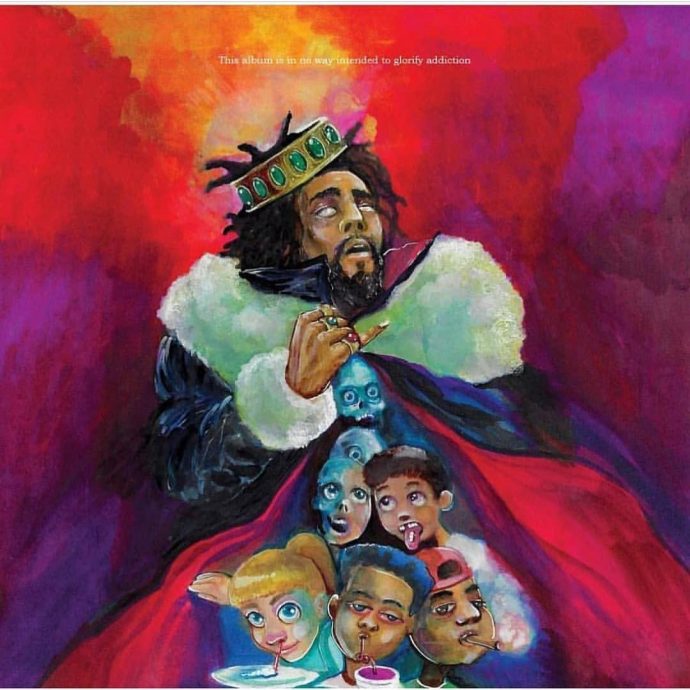Too many people forget what it was like when J. Cole burst onto the scene with “Work Out.” Here was this rapper with a Jay-Z co-sign, spitting over a Kanye sample, talking about what many people felt to be rap clichés. Then, we watched him evolve. His bars improved and we began to identify him with impressive wordplay and emotionally provocative verses. It seemed that J. Cole would be a figurehead in the uncertain future of hip-hop. Now, it feels like this potential has come to fruition for some, but to many others J. Cole’s music feels like watching a good fighter punch below his weight.
KOD has left me on the latter side of the debate. It is not that the record is especially bad, but rather the record is consistent with J Cole’s history of inconsistent projects. In fact, KOD may be one of Cole’s most listenable projects. Each song is easy on the ears, and the album itself is a solid length at 45 minutes. Yet, J. Cole still seems trapped by the failures which haunted “4 Your Eyez Only.”
The album has a strong start sonically. “KOD” is a banger that would fit in well with some of the tracks off 2014 Forest Hills Drive, but its lyrics get into the main issue with J. Cole: focus. KOD’s album cover portrays children using drugs and himself as a dead-eyed King Lear figure. This relates to the album’s title “Kids on Drugs” or “King Overdose.” Problems arise from the fact that this song, the title track, doesn’t point us in either conceptual direction. Is this album about the problems of addiction? We don’t know because Cole undercuts the title track’s drug dealing motif with a discussion of musical features and assertion of his role as a rap figure. He can never seem to keep a track, or an album for that matter, honed in on one topic.
The two next tracks, “Photograph” and “The Cut Off,” seem to follow this pattern of conceptual inconsistency and sonic strength. Both songs have amazing instrumentals, “Photograph” specifically, and melodies, “The Cut Off” being one of the smoother J. Cole flows. The problem arises in their seeming randomness. Why is there a song about Instagram stalking on an album that appears to be about addiction? Admittedly, the song itself is decent, as Cole does do an okay job of portraying a rather creepy act, but this doesn’t change that he subject matter is a total departure from the supposed concept of the album. “The Cut Off” is the embodiment of this problem. The hook deals with drug use, but the verse is actually a well-crafted statement about leaving behind people who take advantage of you. While one could argue that Cole is attempting to connect the hook and verse, suggesting the difficulty of cutting people off and using drugs to cope, the content of the verse does not support this conclusion.
In the face of such inconsistencies, I had assumed that this was in fact not a concept album but just a loose project by Cole. “Once an Addict,” “FRIENDS,” and “1985” quickly shattered this assessment. All of these songs fit perfectly into this addiction theme, and yet Cole bunches them together at the end of an album that mostly consists of unrelated tracks. “Once an Addict” is a deeply heartfelt meditation on his mother’s alcoholism. Why does it come after a song about taxes? This isn’t to say “BRACKETS” isn’t a good song or that the points Cole raises aren’t strong. Rather, I feel confused as a listener. Why does J. Cole take from the momentum and atmosphere of the album by keeping it so random? “FRIENDS,” in its examination of addiction, and “1985,” with its somewhat corny discussion of drug-rap, are both interesting pieces of music, but they cannot carry the thematic message of the whole album on their own.
KOD is not a bad album, but it is not a cohesive album. “Kevin’s Heart,” which is probably one of the better songs in Cole’s discography, is a catchy and meaningful song, but it doesn’t change the fact that it is out of place on an album framed to be about addiction. Every J. Cole album makes you think he’s finally lived up to his potential and every J. Cole album reminds you that he cannot stick to a vision.
Rating: 6.8/10

